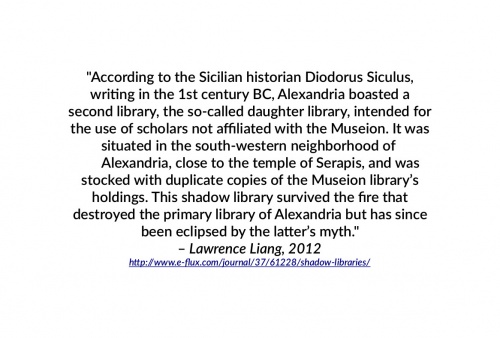alexandrias in Barok 2018
ng](/Lawrence_Liang "Lawrence Liang") wrote a think piece for _e-
flux_ a couple of years ago,
in response to the closure of Library.nu, a digital library that had operated
from 2004, first as Ebooksclub, later as Gigapedia.
He wrote that:
[](http://www.e-flux.com/journal/37/61228
/shadow-libraries/)
In the essay, he moves between identifying Library.nu as digital Alexandria
and as its shadow.
In this account, even large libraries exist in the shadows cast by their
monumental precedessors.
There’s a lineage, there’s a tradition.
Almost everyone and every institution has a library, small or large.
They’re not necessarily Alexandrias, but they strive to stay relevant.
Take the University of Amsterdam where I now work.
University libraries are large, but they’re hardly _large enough_.
The publishing market is so huge that you simply can’t keep up with all the
niche little disciplines.
So either you have to wait days or weeks for a missing book to be ordered
somewhere.
Or you have some EBSCO ebooks.
And most of the time if you’re searching for a book title in the catalogue,
all you get are its reviews in various journals the library subscribes to.
So my colleagues keep asking me.
Dušan, where do I find this or that book?
You need to scan through dozens of texts, check one page in that book, table
of contents of another book, read what that paper is about.
[![Arts humanities and social sciences
Display 200 300 400 500 600 700 800 900 1000 ALL characters around the word.